River to Recovery
By Ryan Pepper and Johanna Miller MA, LPCC
*This is an article from the Summer 2020 issue of Combat Stress.
My journey to lead a chapter of an organization for Veterans is probably not what you would expect. You see, I have never served in the military. I have worked in the private and public sector as a mechanical contractor for over 25 years. Becoming involved with Team River Runner was unexpected and life changing.
Team River Runner (TRR) is a non-profit 501c3, with a mission to provide all Veterans and their families an opportunity to find health, healing, community purpose, and new challenges through adventure and adaptive paddle sports. TRR believes that every wounded and disabled Veteran deserves the opportunity to embrace new challenges, develop leadership, and benefit from camaraderie. TRR provides an outlet to fulfill these beliefs – inviting wounded and disabled Veterans and their families to participate in adaptive paddling programs.
Founded in 2004 at Walter Reed National Military Medical Center by Joe Mornini and Mike McCormick, TRR now offers weekly paddling sessions in more than 60 locations across the nation. TRR is more than an adaptive sports program; it is an opportunity for Veterans, their family members, and everyone in the community to participate. It is an opportunity to enjoy nature and realize its social, physical, and emotional benefits, whether this involves tackling whitewater rapids or paddling on peaceful flat-water. It is an environment that facilitates connection, allowing Veterans to reunite with their families and forge relationships with those who have endured similar pain. TRR creates purpose and community service. Our Veterans are on the river to recovery.
According to the 2019 National Veteran Suicide Prevention Annual Report, an average of 16.8 Veterans died by suicide every day in 2017, amounting to the death of 6,139 Veterans by suicide in 2017. Veterans ages 18 to 34 had the highest suicide rate (44.5 per 100,000), increasing by 76 percent from 2005 to 2017. As the report explains, there is no all-encompassing explanation for suicide.
There is no single path to suicide or away from suicide. There is no single medical cause, etiology, treatment or prevention strategy. Instead, suicide involves dynamic and individual interactions between many different domains. War, economic disparities, media portrayal, policies pertaining to health care access and actual health care access, employment opportunities, level of community services and connectedness, homelessness, level of social supports, intensity of relationship problems, physical and mental health, are all covert but powerful conspirators with suicide. TRR’s goal is to play a part in addressing some of these needs and healing some of these wounds.
Every Veteran has a personal story. Learning to acknowledge, accept, and find a purpose, with our stories, can mean the difference between suffering and living. Through kayaking together, Veterans are able to spend time with people who understand their stories in a way that family members, friends, and co-workers who have not served cannot understand. The healing is in the power of being together, being understood, being accepted, helping one another, facing challenges together, facing fears together, finding hope, finding friends, and finding purpose.
TRR has local chapters in almost every state, and they independently plan events throughout the year. Each chapter coordinator understands the healing power of kayaking and is very knowledgeable, or has access to someone who is, in adapting boats to the different physical needs of disabled Veterans. The focus is on training Veterans to be the instructors, guides, and supports, increasing comradery, leadership, training, purpose, and healing. There is nothing more rewarding than to see someone who thought they would not be able to independently paddle a kayak because of physical, cognitive, or emotional challenges, to get out of the water for the first time.
My wife, Johanna, and I became chapter co-coordinators for TRR Northeast Ohio in the fall of 2019 after being involved with TRR for about six years. I am an American Canoe Association (ACA) Level 2 Kayak Instructor and have my ACA Adaptive Paddling Endorsement, which means that I have been trained to work with individuals of all abilities and know how to adapt kayaks to meet their needs. Johanna is a Licensed Professional Clinical Counselor, with 20 years of experience working with individuals across the lifespan and life experiences. Together we hope to provide the foundation for building a strong, growing, successful TRR chapter.
Adaptive paddling allows almost anyone to get on the water and paddle independently. All Veterans are welcome and encouraged to come to TRR events. Due to their experiences, most of our Veterans experience post-traumatic stress disorder (PTSD) symptoms. They have reported that they find the supportive, traumainformed, and experiential environment of TRR events to be powerfully healing in a way that traditional therapy cannot.
Our Veterans with physical needs are able to kayak with the assistance of endless adaptive equipment. That could mean adding supports for someone who is paralyzed and unable to sit without support, providing paddle stands for those with arm or hand injuries or amputations, floats to assist with balancing the boat, guides for those blind or visually impaired, and endless other creative solutions. The amazing thing about kayaking is that when you see someone out on the water, you cannot tell the difference between those who are blind, paralyzed, traumatized, amputees, or those with or without cognitively impairments. Watching the reactions of others is priceless, as the kayakers climb out of the water and get into a wheelchair, grab an elbow to be guided, or reattach prosthetics. Simply put, water is the great equalizer.
In addition to local chapters, TRR offers clinics around the United States that have specific focuses such as, mentorship, leadership, whitewater skill building, sea kayaking, and a specific series for Veterans who are blind or visually impaired. The OuttaSight Series offers blind and visually impaired Veterans the opportunity to learn to paddle on their own, with only the help of a guide (and hopefully in the near future with technological guidance) in a variety of water settings, while learning leadership skills, enjoying competition, and experiencing adventures. To guide and support the blind and visually impaired participants, TRR teaches sighted disabled Veterans to be their instructors, which increases both camaraderie and the effectiveness of training. Recently, TRR started a branch of the Outtasight series called KAOS (Kids Are OuttaSight), where Veterans teach kayaking to blind and visually impaired children. This program allows Veterans to use their paddling skills learned through TRR to help those in their own communities.
In September of 2018, TRR sent “Vision Team,” five visually impaired Veterans, and their 15 safety guides on an incredible, first-of-its-kind, adventure down all 226 miles of the Colorado River through the Grand Canyon system. The Veterans were able to accomplish this incredible feat through teamwork with their guides, who called out commands as they twisted, turned, and flipped out of boats all the way down the river. Watching them conquer the Colorado River leaves no doubt they are still as strong as ever.
There are videos available on You tube following “Vision Team” on this Colorado River adventure, as well as an interview broadcast on the Today Show (NBC, November 29, 2018). Be prepared to be humbled and amazed.
I largely avoided challenging athletics since high school due to the disabling effects on my breathing from a football injury. In 2001, while vacationing at Lake George, NY with my family, I was introduced to kayaking for the first time. There was something about being out on the water in a kayak that instantly grabbed me. At the time,
I was unable to understand the psychological impact of kayaking. All I knew was that I did not feel constantly out of breath but did feel as if I was in complete control. From that point on, I was hooked. I started paddling often and began paddling with other people. It amazed me that no one ever noticed or questioned my breathing or had any idea that I had a disability. My confidence grew as my kayaking skills developed and as I took more and more of a leadership role in my local and state kayak community.
In 2015, I was invited to a Chapter TRR Northeast Ohio pool session. I watched as eight Veterans reveled in playing a game of kayak football. Kayak football is a group game activity, often played at the end of a training session to practice learned skills. It is basically a combination of football, rugby, and soccer, on water. And, yes…it is that much fun! After the pool session, the chapter coordinator, a couple of the Veterans, and I were talking about how wonderful it would be to recruit a bunch of Veterans to play in a kayak football tournament. In a parking lot, on a cold March day, the Veterans Kayak Football Challenge was created.
The idea of a kayak football challenge took off immediately and created much buzz and excitement among kayakers, Veterans, and people who wanted to help out with this event. After considering several locations, I approached the community of Willowdale Lake, in Stark County, OH. This community embraced the idea, without understanding a single thing about kayak football, agreeing to host the event. We were going to play kayak football in Canton, Ohio, on the same day as the Pro Football Hall of Fame would have opened their pre-season event just up the road!
On Sunday, August 9, 2015, it all came together. It would be a 2-day event, including camping together, river paddling, and ending with the Veterans Kayak Football Challenge. The purpose of the tournament was to honor our Veterans in an entertaining and unique way, while at the same time, exposing an entirely new audience to the larger world of adaptive kayaking, water sports, and the benefits gained through paddling. Many of the Veterans who participated had disabilities, including, paralysis, blindness, amputations, and PTSD; though these were invisible when they were in kayaks and charging for the ball! We had eight teams, set up in two divisions, and played a round robin tournament of three games each. This ended with a championship game in two Olympic pool-sized fields set up in the lake.
That first year, Veterans came in from six states and from as far away as North Carolina to participate in this event. We now have Veterans coming from 23 states and from as far away as California. Many Veterans return year after year, looking forward to spending time together, enjoying the support of volunteers and spectators, and of course, playing kayak football.
Johanna and I are currently planning the 6th Annual Veterans Kayak Football Challenge with the help of a team of people who have come to support and to value this annual event. Veterans Kayak Football Challenge has become one of TRR’s national events, as well as an event that the Willowdale Lake Community and local supporters prepare for and look forward too every year. Unfortunately, given the current challenges we are facing as a world, we do not know what will happen this year. However, no matter what happens this year, the Veterans Kayak Football Challenge and all those who support it will be here planning for the next event regardless!
I believe that we have accomplished our goals as intended. We welcome and host Veterans from around the country to participate in the Veterans Kayak Football Challenge. Everyone present honored our Veterans and opened their eyes to a much larger paddling world. For me and for many of the people in attendance, it was much more than that. The tournament was the greatest example of the power of paddling…. the power to bring people together from all walks of life, the power to make people laugh and have fun, and the power to heal the human spirit.
ABOUT THE AUTHORS
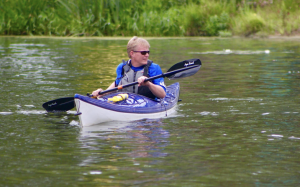 Ryan Pepper is an avid kayaker, an advocate for our waterways, and has worked as a Piping Mechanical Contractor in the industrial, government, and private sectors for 30 years. In 2012, he became a Level-2 Kayak Instructor through the American Canoe Association (ACA) at Kent State University. In 2014, he earned his adaptive paddling certification through the University of Akron and was voted in as the State Director of Ohio for the ACA, a newly created volunteer position to develop membership, participation, education, and communication regarding the ACA and for paddling in general. He served in that capacity until 2019. As State Director, Mr. Pepper acted as an advocate for water access across Ohio, assisted in the development of several water trails, helped parks departments in applying for grants to make paddling accessible to all, and presented before the Ohio General Assembly regarding making improvements to Ohio waterway safety. He still serves on the ACA Ohio Executive Board as its Public Policy Officer and is working, as part of a team, towards the removal of several dams, as well as, increasing and improving signage throughout Ohio to make waterways safer for paddlers. Mr. Pepper is also a TRAK Kayak Pilot, which has connected him with some of the top paddlers in the world and has enabled him to serve as an ambassador for the company, filling a number of roles, including providing test paddle demonstrations, participating in TRAK events and meetings, and documenting his expeditions.
Ryan Pepper is an avid kayaker, an advocate for our waterways, and has worked as a Piping Mechanical Contractor in the industrial, government, and private sectors for 30 years. In 2012, he became a Level-2 Kayak Instructor through the American Canoe Association (ACA) at Kent State University. In 2014, he earned his adaptive paddling certification through the University of Akron and was voted in as the State Director of Ohio for the ACA, a newly created volunteer position to develop membership, participation, education, and communication regarding the ACA and for paddling in general. He served in that capacity until 2019. As State Director, Mr. Pepper acted as an advocate for water access across Ohio, assisted in the development of several water trails, helped parks departments in applying for grants to make paddling accessible to all, and presented before the Ohio General Assembly regarding making improvements to Ohio waterway safety. He still serves on the ACA Ohio Executive Board as its Public Policy Officer and is working, as part of a team, towards the removal of several dams, as well as, increasing and improving signage throughout Ohio to make waterways safer for paddlers. Mr. Pepper is also a TRAK Kayak Pilot, which has connected him with some of the top paddlers in the world and has enabled him to serve as an ambassador for the company, filling a number of roles, including providing test paddle demonstrations, participating in TRAK events and meetings, and documenting his expeditions.
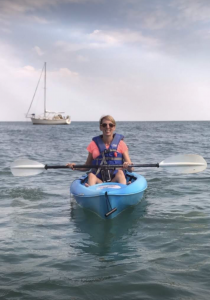 Johanna Miller MA, LPCC, has been a Licensed Professional Clinical Counselor for almost twenty years. Her diverse career has given her experience with a wide variety of populations and psychological difficulties. She began her career at an agency for children and adolescents with emotional, social, and behavioral needs in Canton, OH, providing family counseling for traumatized children attending a day treatment program and working with sexually abused children. Ms. Miller went on to become trained in psychological assessment and worked as a psychological assessor and as a school psychology assistant. She has worked in community-based and private practice settings, private and public schools and both home-based and office-based settings, with clients ranging in age from three to 94 years, and with individuals from all socioeconomic backgrounds. She has also had the opportunity to work with first responders, police officers, and Veterans. For the past two years Ms. Miller has worked as the counselor in a primary care setting working with adults ages 16 to 94, who are struggling with problems such as depression, anxiety, PTSD, grief, adjustment disorders and interpersonal problems. She also maintains a private practice.
Johanna Miller MA, LPCC, has been a Licensed Professional Clinical Counselor for almost twenty years. Her diverse career has given her experience with a wide variety of populations and psychological difficulties. She began her career at an agency for children and adolescents with emotional, social, and behavioral needs in Canton, OH, providing family counseling for traumatized children attending a day treatment program and working with sexually abused children. Ms. Miller went on to become trained in psychological assessment and worked as a psychological assessor and as a school psychology assistant. She has worked in community-based and private practice settings, private and public schools and both home-based and office-based settings, with clients ranging in age from three to 94 years, and with individuals from all socioeconomic backgrounds. She has also had the opportunity to work with first responders, police officers, and Veterans. For the past two years Ms. Miller has worked as the counselor in a primary care setting working with adults ages 16 to 94, who are struggling with problems such as depression, anxiety, PTSD, grief, adjustment disorders and interpersonal problems. She also maintains a private practice.
Ryan and Johanna have been married for 27 years. They became co-coordinators for the Northeast Ohio Chapter of Team River Runner in Fall 2019.They have two adult sons, Zach and Brendan, who also assist with the Veterans Kayak Football Challenge. Ryan and Johanna live in North Canton, OH on a lake, where they are able to enjoy their love of kayaking.
Combat Stress Magazine
Combat Stress magazine is written with our military Service Members, Veterans, first responders, and their families in mind. We want all of our members and guests to find contentment in their lives by learning about stress management and finding what works best for each of them. Stress is unavoidable and comes in many shapes and sizes. It can even be considered a part of who we are. Being in a state of peaceful happiness may seem like a lofty goal but harnessing your stress in a positive way makes it obtainable. Serving in the military or being a police officer, firefighter or paramedic brings unique challenges and some extraordinarily bad days. The American Institute of Stress is dedicated to helping you, our Heroes and their families, cope with and heal your mind and body from the stress associated with your careers and sacrifices.

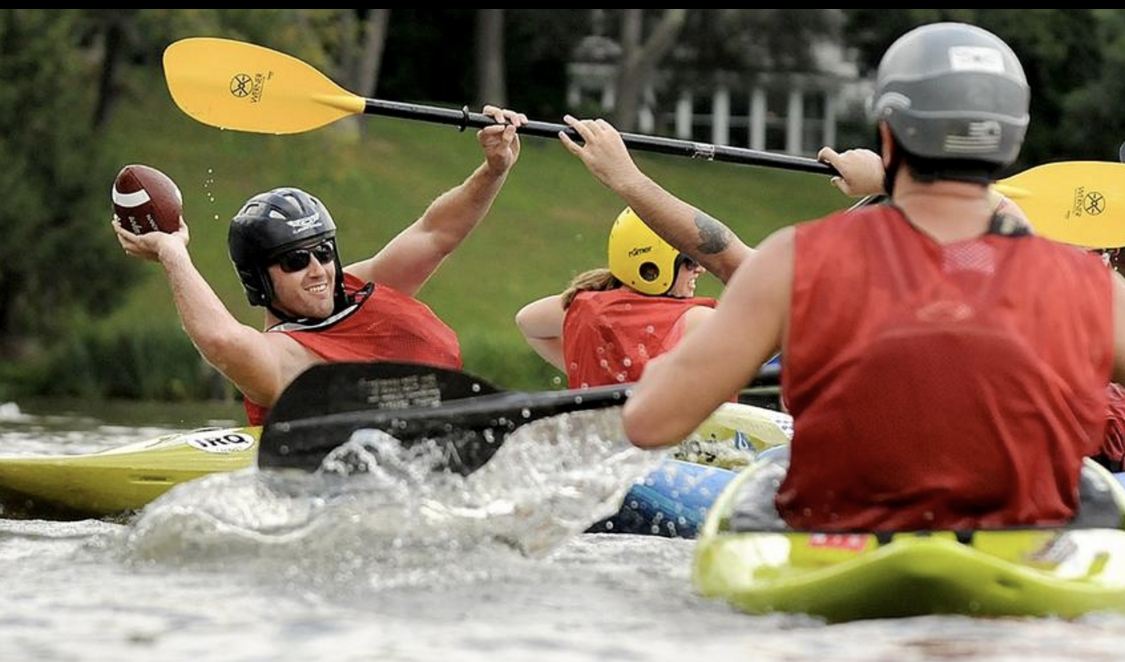
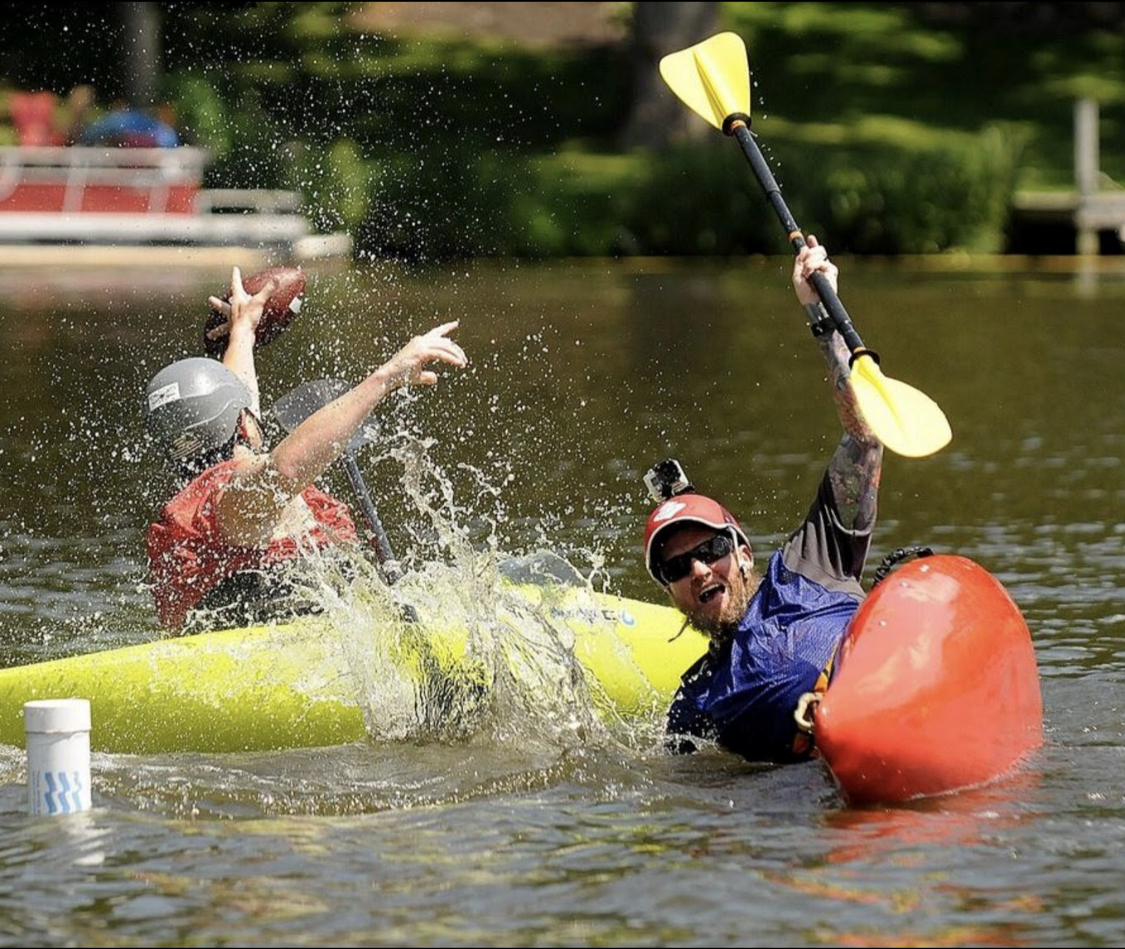
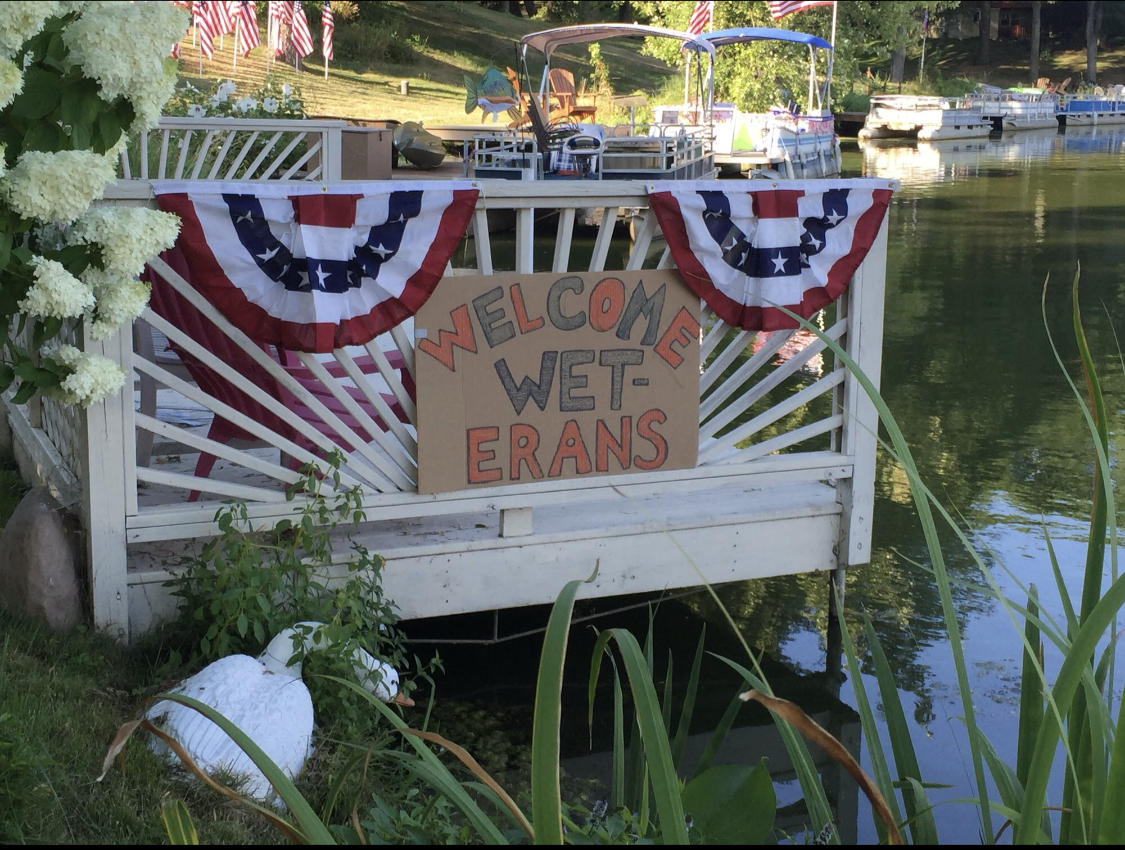
Leave A Comment
You must be logged in to post a comment.